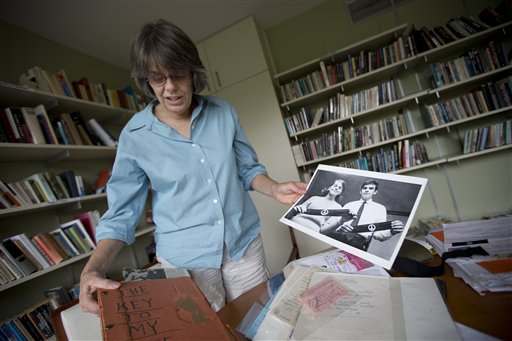In Tinker v. Des Moines Independent Community School District, 393 U.S. 503 (1969), the Supreme Court ruled that public school officials cannot censor student expression unless they can reasonably forecast that the speech will substantially disrupt school activities or invade the rights of others. The decision firmly established that public school students possess First Amendments rights. Tinker remains the seminal decision on student speech.
Students suspended for protesting the Vietnam War through black armbands
In December 1965, a group of parents and students in Des Moines, Iowa, gathered to discuss ways to protest the Vietnam War and proclaim their support for a truce. One of the actions selected was for students to wear black armbands. School officials learned of the plan and quickly passed a policy prohibiting armbands. They continued, however, to allow students to wear political campaign buttons and Iron Crosses. Several students—including Christopher Eckhardt, John Tinker, and Mary Beth Tinker—wore the armbands to school and faced suspension. The armbands caused no real disruption of school activities.
The students’ families challenged the suspensions on First Amendment grounds in federal court. A federal district court judge dismissed the lawsuit in 1966, finding that the school rule was a reasonable way to prevent student disturbances. The Eighth Circuit Court of Appeals divided evenly, which allowed the lower court decision to stand. The students then appealed to the Supreme Court and won in a 7-2 decision.
Court overturned student suspension
Writing for the majority, Justice Abe Fortas stated that it “can hardly be argued that either students or teachers shed their constitutional rights to freedom of speech or expression at the schoolhouse gate.” He focused on the fact that school officials could point to no evidence that the armbands would disrupt school activities. He noted that an “official memorandum prepared after the suspension that listed the reasons for the ban on wearing the armbands made no reference to the anticipation of such disruption.”
Fortas also noted that school officials had selectively chosen only one symbol to ban. He reasoned that this indicated that school officials sought to single out “the prohibition of expression of one particular opinion.” Citing Burnside v. Byars (5th Cir. 1966), Fortas articulated what has come to be known as the Tinker standard—school officials cannot censor student expression unless they can reasonably predict that the expression will create a substantial disruption or material interference in school activities or invade the rights of others.
Justices Potter Stewart and Byron R. White each wrote short concurring opinions that did not contribute to subsequent First Amendment jurisprudence.
Dissenters thought courts should defer to schools
Justices Hugo L. Black and John Marshall Harlan II wrote separate dissents. Black accused the majority of contributing to the “beginning of a new revolutionary era of permissiveness in this country” and “surrender[ing] control of the American public school system to public school students.” Harlan asserted that courts should defer to the reasonable judgment of school officials unless students carry their burden of “showing that a particular school measure was motivated by other than legitimate school concerns.” He determined that the students in Tinker had failed to meet this burden.
Court made exceptions to Tinker
In the 1980s, the Court carved out exceptions to Tinker in Bethel School District No. 403 v. Fraser (1986), Hazelwood School District v. Kuhlmeier (1988), and Morse v. Frederick (2007). The Court in Fraser empowered school officials to regulate student speech that was vulgar, lewd, and plainly offensive and in Hazelwood created a more lenient reasonableness standard for reviewing school officials’ regulation of school-sponsored student expression. The Court in Morse ruled that public school officials can restrict student speech that they reasonably believe advocates illegal drug use. Tinker remains the leading student speech precedent for First Amendment jurisprudence.
David L. Hudson, Jr. is a law professor at Belmont who publishes widely on First Amendment topics. He is the author of a 12-lecture audio course on the First Amendment entitled Freedom of Speech: Understanding the First Amendment (Now You Know Media, 2018). He also is the author of many First Amendment books, including The First Amendment: Freedom of Speech (Thomson Reuters, 2012) and Freedom of Speech: Documents Decoded (ABC-CLIO, 2017). This article was originally published in 2009.

